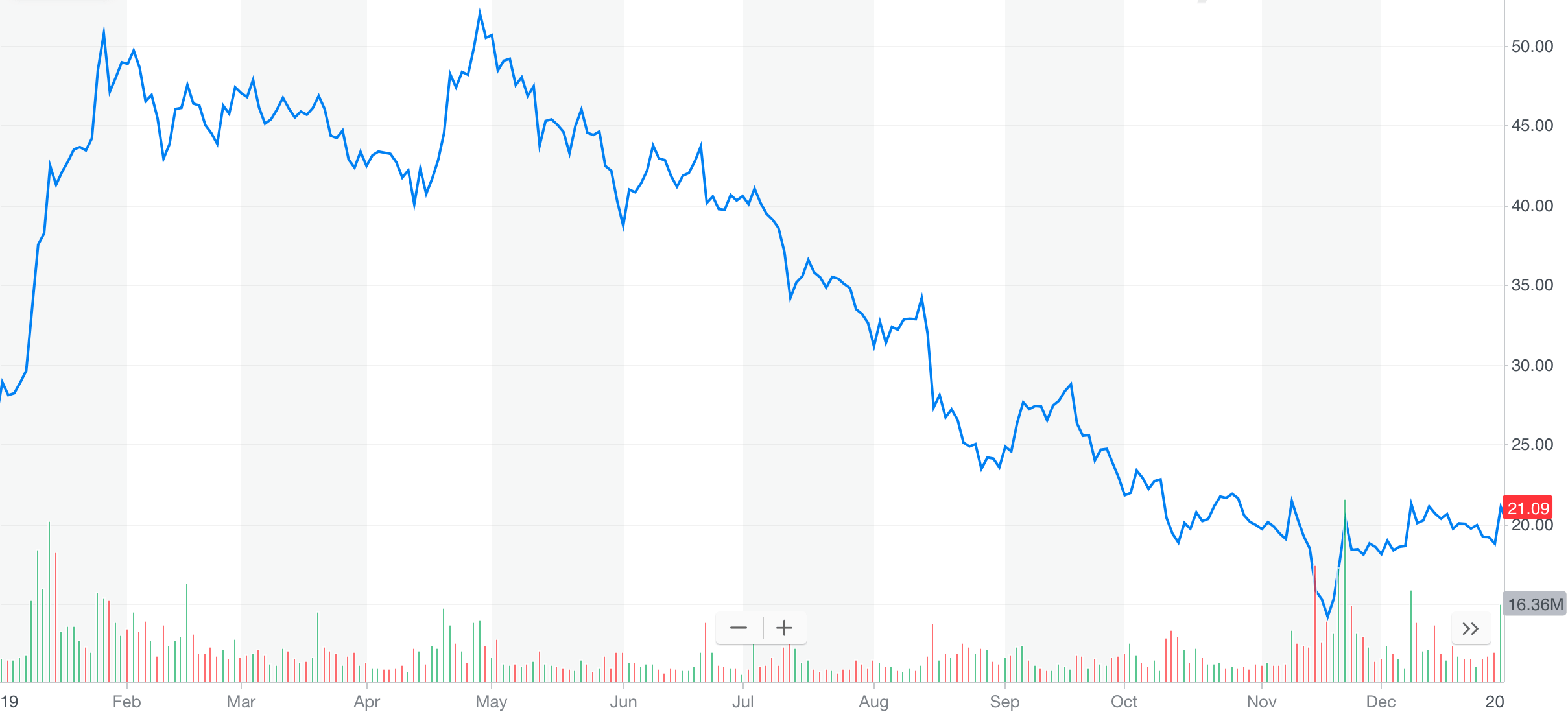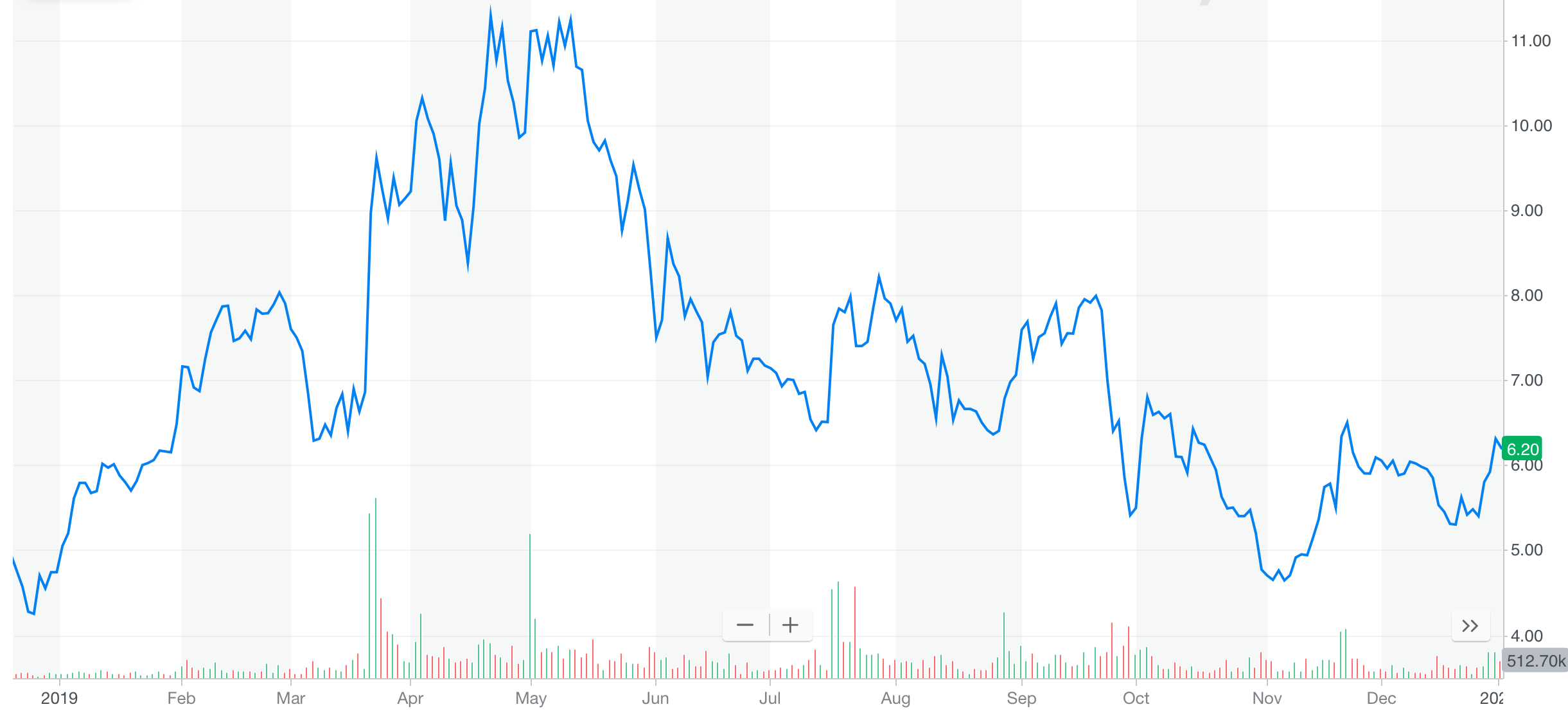Everything Wrong With The Cannabis Industry: Investors Beware

The cannabis industry was supposed to be life-changing for early investors. So far, the opportunity appears to have gone bust. | Image: AP Photo / Noah Berger
- Marijuana is now legal for medical use in 33 states and recreational use in ten states, yet it remains a Schedule 1 drug.
- Stock prices of large companies like Canopy Growth and Cronos Group have fallen by more than 65% since their earlier highs in 2019.
- As bad as 2019 was for the cannabis industry, this year could be even worse.
Last year’s plunge in cannabis stocks has led some analysts to compare the industry to the dot-com bust of the early 2000s. Why did it happen and who is to blame?
For most of the past century, marijuana was classified as a “Schedule 1 drug,” putting it alongside dangerous LSD and heroin. The business of growing, processing and selling was conducted behind closed doors.
Things Have Changed
The cannabis industry enjoyed massive hype after legal recreational sales took hold in Canada and medical use became a thing in more than half of the U.S.
Marketers have bombarded the internet promoting the cannabis industry, setting the stage for expansion after a whole century in the shadows.
Several producers got listed on the major stock exchanges. A swirl of legal cannabis stocks has allured many seeking to pour cash into this ‘asset of the future.’
All of it sounded too good to be true. That should have been the first red flag.
With very few exceptions, cannabis stocks experienced an unforgiving downtrend throughout 2019, with some dropping double-digits percentage-wise. Going into a new decade, the market still remains sluggish.
A big reason these stocks plunged is because the underlying business is still losing money. In its latest quarterly report, the largest cannabis stock by market cap, Canopy Growth (NYSE:CGC), revealed it paid more in share-based compensation than it generated in net sales [MarketWatch].
Is It Just Empty Hype?
Now that cannabis is becoming legal, there’s nothing special about it. It’s just another crop, like corn or wheat. Case in point: There are more than 9,000 marijuana growers across the U.S. [Forbes]. Would you believe this figure exceeds the number of American breweries? It does.
Competition Already Cut Stock Prices in Half
At first, there were only a few pot growers, so they could charge sky-high prices. But new companies were quick to flood the growing market, making the price compression a future of the cannabis industry.
After hype started to fade away, investors ran for the exits. In 2019, Tilray (NASDAQ:TLRY) shares fell 90% and Canopy Growth slumped 60% from its all-time high.

Never-Ending Frauds
Last year, Canadian CannTrust (TSE:TRST) was accused of growing marijuana illegally, leading to an official suspension of the company’s cultivation and sales licenses. The event had a negative impact on the entire cannabis industry as investors’ confidence in pot stocks had been shaken. If CannTrust could purposely deceive regulators, what stops other companies from doing the same?
To make matters worse, a statement from the FDA on the CBD status was published in November. The federal agency stated that it “cannot conclude that CBD is generally recognized as safe” for use in food.
The FDA sent a warning letter to Curaleaf (CNSX:CURLF). It said the company’s CBD products, including its tinctures, pain-relief patches, lotions and vape pens, were all “misbranded drugs,” with their retail violating the Federal Food, Drug, and Cosmetic Act. The company’s share price fell dramatically.

After All, It’s Still Money Laundering
There are plenty of obstacles for the cannabis industry to thrive. One of them is finding accessible banking.
As the legalization of marijuana use becomes more widespread, the possession, distribution or sale of it remains illegal under federal law. Any contact with money that can be traced back to marijuana operations could possibly lead to a bank facing criminal prosecution for “aiding and abetting” a federal crime and money laundering.
Current federal laws are forcing the emerging cannabis industry to operate on a cash-only basis, creating a public safety issue.
Medical Community Is Also Skeptical
While some doctors support cannabis and medical marijuana, the majority still believes these should remain illegal. This stigma in medical facilities creates a major challenge that investors should recognize: Hspitals do not receive federal funding if they promote cannabis.
So, Will The Future Ever Turn Green?
It doesn’t seem like the U.S. has any appetite to reform federal marijuana laws any time soon. While there were already two votes in the House aimed at either de-scheduling the drug or at least reforming cannabis banking laws, these proposals have yet to reach the Senate floor.
Meanwhile, Senate Majority Leader Mitch McConnell seems to have no intention to legalize marijuana [Nasdaq]. It might change in the future, but for now, marijuana has little to no chance of being reformed at the federal level in 2020.
Many cannabis companies remain penny stocks, trading mainly in the over-the-counter markets. This could change if regulators decide to give it the green light, and large corporations finally choose to invest in the sector. Then, a handful of cannabis stocks could beat the odds.
Disclaimer: The above should not be considered trading advice from CCN.com.